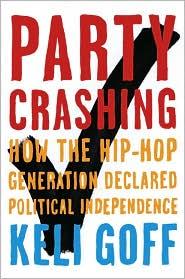Party Crashing: How the Hip-Hop Generation Declared Political Independence

In Party Crashing, Keli Goff develops an argument relevant to this election: how does the young, African American person vote? Exploring points relevant to black culture, she shows the hip-hop generation finding itself with unmet needs and points out that the support a black person wants or needs differs from that of a white person. Currently, it is assumed black voters automatically support Democratic politicians because Democrats hear and respond to their needs. Goff shows that this is no longer the case, and she elaborates on issues concerning this group of voters. Presenting testimonial of varied black leaders, the author questions what makes a leader powerful. She covers Republicans, Democrats, and Independents - offering a more thorough coverage of representatives.
Although a hot issue, race is not the only issue. Economic status, although an exception at times, ties in with race, and therefore, the issue remains more than a "black" issue; it is also a socio-economic issue. Who can represent this specific demographic in politics today? Pinpointing cultural differences, Goff proposes the lack of a "universal black experience" as perhaps causing a riff in the black dynamic when voting. Goff discusses the title bestowed upon Bill Clinton as the "first black president" because he represents the non-elite, nonprivileged and Southern culture of so many black citizens.
Overall, Party Crashing brings important points to light about African American culture and what voter representation means. Using common knowledge and political leaders, she elaborates on certain leaders, both black and white, who meet the needs of black people today. Utilizing a random study, as well as interviews of powerful leaders, Goff gives the reader an exploration of hip hop culture and why people vote the way they do.
It is difficult to really respond without reading the entire text, but the book seems interesting. Personally, choosing a Republican has never been an option for me because this is something I have been taught not to even consider. The more I educate myself, the more I have started to lean towards a more independent candidate, some of whom have my best interest at heart being a African-American woman who actually cares about the rights of women and the environment around me. I wonder if the author has considered or actually does inquire about the amount of African Americans that do not vote at all.